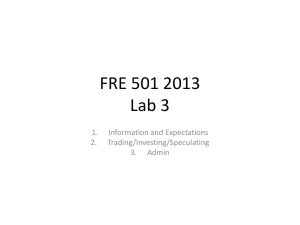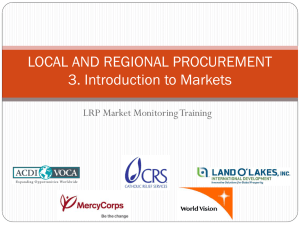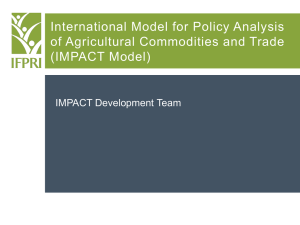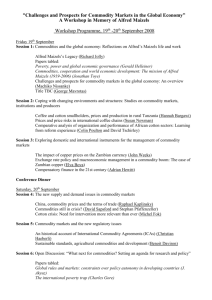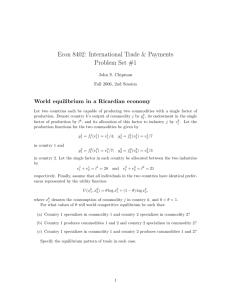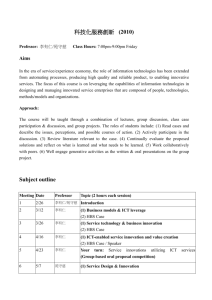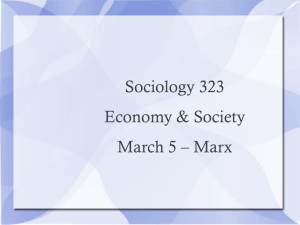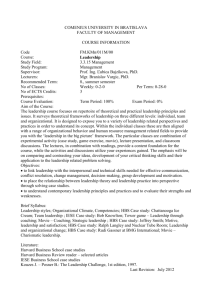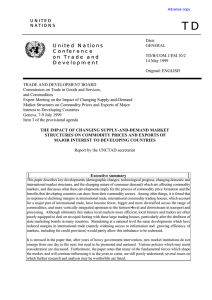Trading and Investing in Commodities
advertisement
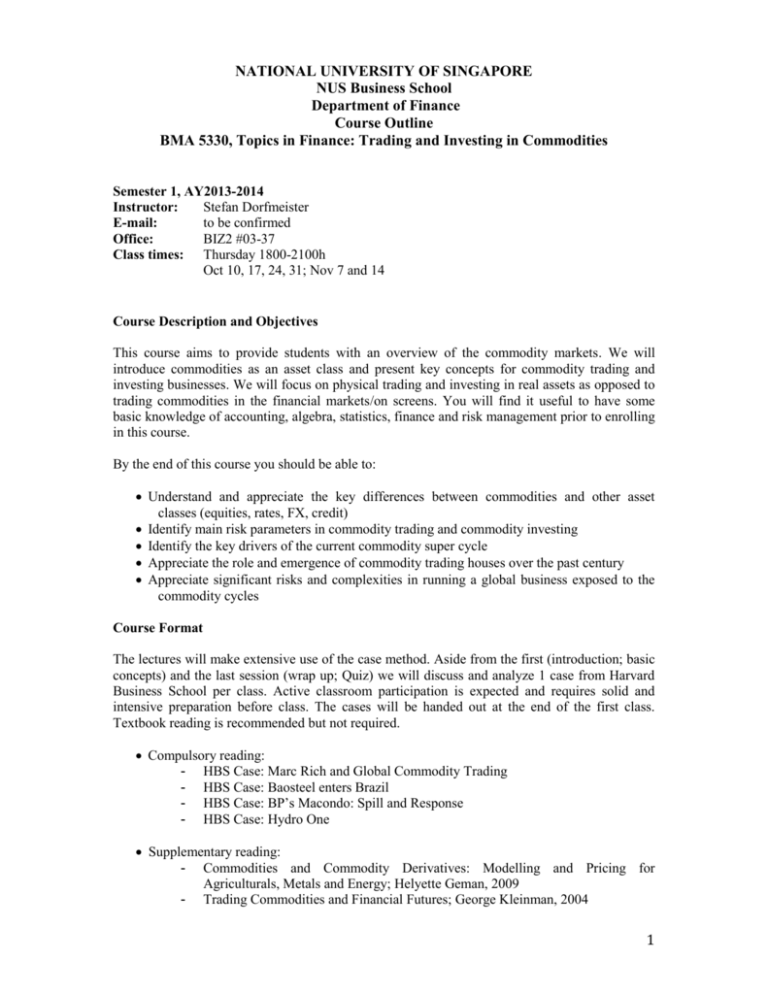
NATIONAL UNIVERSITY OF SINGAPORE NUS Business School Department of Finance Course Outline BMA 5330, Topics in Finance: Trading and Investing in Commodities Semester 1, AY2013-2014 Instructor: Stefan Dorfmeister E-mail: to be confirmed Office: BIZ2 #03-37 Class times: Thursday 1800-2100h Oct 10, 17, 24, 31; Nov 7 and 14 Course Description and Objectives This course aims to provide students with an overview of the commodity markets. We will introduce commodities as an asset class and present key concepts for commodity trading and investing businesses. We will focus on physical trading and investing in real assets as opposed to trading commodities in the financial markets/on screens. You will find it useful to have some basic knowledge of accounting, algebra, statistics, finance and risk management prior to enrolling in this course. By the end of this course you should be able to: Understand and appreciate the key differences between commodities and other asset classes (equities, rates, FX, credit) Identify main risk parameters in commodity trading and commodity investing Identify the key drivers of the current commodity super cycle Appreciate the role and emergence of commodity trading houses over the past century Appreciate significant risks and complexities in running a global business exposed to the commodity cycles Course Format The lectures will make extensive use of the case method. Aside from the first (introduction; basic concepts) and the last session (wrap up; Quiz) we will discuss and analyze 1 case from Harvard Business School per class. Active classroom participation is expected and requires solid and intensive preparation before class. The cases will be handed out at the end of the first class. Textbook reading is recommended but not required. Compulsory reading: - HBS Case: Marc Rich and Global Commodity Trading - HBS Case: Baosteel enters Brazil - HBS Case: BP’s Macondo: Spill and Response - HBS Case: Hydro One Supplementary reading: - Commodities and Commodity Derivatives: Modelling and Pricing for Agriculturals, Metals and Energy; Helyette Geman, 2009 - Trading Commodities and Financial Futures; George Kleinman, 2004 1 Assessment Your grade will be based on your performance in class (50%), case summary reports (25%) and a final quiz (25%). The case summary reports are to be done by groups of approximately four to five students. Students are encouraged to form their individual groups for the case summary reports. Class Participation Simply attending the class is not enough to get a favorable class participation grade. In evaluating class participation, I will look for comments that are thoughtful and lead the discussion forward. I will ask one or several students to open a case (“cold call”) but might also consider volunteers to get the classroom discussion going (“soft opening”). Throughout the lectures I will call on students to assume the roles of case protagonists. I expect them to provide the class with their individual and specific approach on how to deal with a concrete situation. To assist me in evaluating your class participation I would ask you to bring nameplates to class and pick the very same seat for the duration of the course. Summary Group Case Reports Each group (students will select their own groups) will have to submit a case memorandum for a case that we will discuss in class. At the end of the term I will grade only one randomly selected assignment. Failure to turn in an assignment (even one which is not eventually graded) by the deadline will have negative implications for your grade. The case report should be a maximum of two pages (typed and double-spaced) for the write-up and a maximum of three pages for any supporting tables/graphs/exhibits. Final Quiz A 90 – 120 minute quiz based on a on a short case (not necessarily HBS) in essay format where students are expected to propose a buy/sell decision and highlight their rationale. The case will be handed out in class. Contact Information I am happy to meet students who have enrolled before the course starts and during the semester. To ensure that I am available for consultation, I recommend that you make an appointment. I encourage students to contact me through email. 2 Detailed List of Topics The following is a list of some of the topics that we will cover in this course. Based on the progress of the class, minor changes (additions or deletions) may be made to this list. 1. Overview of the Commodity Markets a. Contango, Backwardation b. Volatility c. Counterparty Risk 2. Commodity Cycles a. Key themes of the last decade b. Evolving trends influencing the commodity markets 3. History of Physical Commodity Trading – HBS Case; Mark Rich 4. Commodities and the Environment – HBS Case; BP’s Macondo 5. Commodities and Risk Management - HBS Case; Hydro One 6. Commodities and M&A – HBS Case; Baosteel enters Brazil 3
